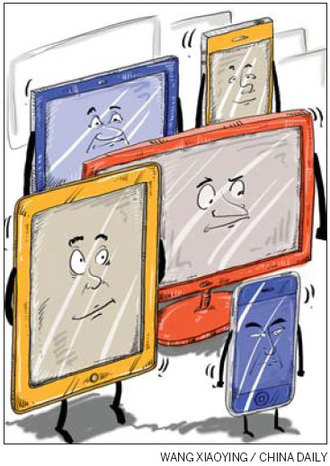View
Screenage apocalypse just a load of hype
Updated: 2011-02-16 07:53
By Jules Quartly (China Daily)
 |
I'm trying to get anyone who bites to bet the world will end in 2012. I haven't had many takers, I confess, as even those who do believe we are about to dissolve in a solar flare on Dec 21 are not keen on putting down their money. I should have capitalized on the apocalyptic movie, 2012, which was a hit in China last year.
It seems to me that each generation thinks of itself as The It generation and requires its own end-of-times mythology, rather than accepting the more likely conclusion that we are just biological data drifting with the currents of time into eternity.
 |
To believe we are living in a unique period and on the edge of history is essentially an egocentric way of looking at life, meaning just because I exist it doesn't mean to say everything exists for me. This is the sort of mistake both children and adults make and is part of the reason why each generation feels the need to define the one that follows in comparison to itself.
The assessment is generally negative. On the mainland we have the post-80s generation, who are described as selfish and soft because they were not tempered by the fires and trials of revolution. In Taiwan, 20-40 year olds are called the "strawberry generation" because they're supposed to be easily bruised and are spoiled. Elsewhere, there is generation-Y, or the Net generation.
The biggest obvious difference between this generation and its predecessors is the rise of computers, digital architecture and the Web, so there is a consensus this is the "Internet Age" and teenagers are thereby known as screenagers.
The term teenager wasn't invented until the 1940s, before which there were just children and adults. A word was required to describe what appeared to be a new demographic, for whom the keys to independence - sex, drinking, legal rights - were still being cut.
Screenagers, we are told, concentrate less on more. They are out of touch with the real world. Their heads are turned by computer games and they become addicted.
For instance, a recent study suggested one in 10 Singapore school children are gaming addicts and as a result they get depressed, anxious, have social phobias and their grades drop. Parents are advised to limit their children to just two hours of TV or computer use a day, or risk their eyesight and mental well-being.
This is at the same time when a huge number of adults are stuck at screens not just at work all day but at home - and often the journey between. Looked at this way, screenagers are just being prepared for the reality of their lives and if teens aren't computer literate they are actually ignorant.
We could just as easily believe screenagers are better informed, more able to assimilate information and are comparatively peaceful because they are content to tap away at keys and operate in cyberspace rather than stir up trouble in the real world.
I'm willing to bet the end's not coming soon and screenagers are the same as everyone else.
E-paper

Sindberg leaves lasting legacy
China commemorates Danish hero's courage during Nanjing Massacres.
Crystal Clear
No more tears
Road to the Oscars
Specials

NPC & CPPCC sessions
Lawmakers and political advisers gather in Beijing to discuss major issues.

Sentimental journey
Prince William and Kate Middleton returned to the place where they met and fell in love.

Rent your own island
Zhejiang Province charts plans to lease coastal islands for private investments
